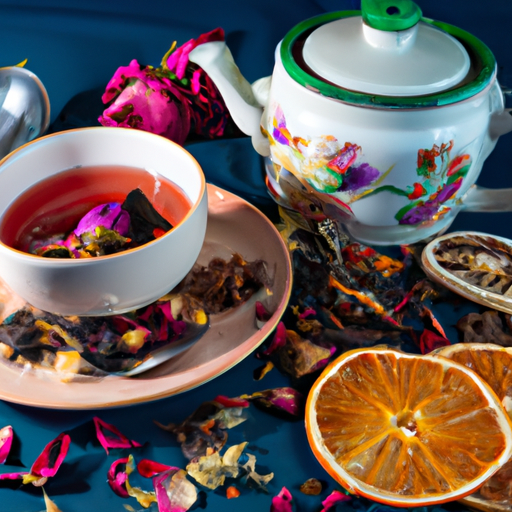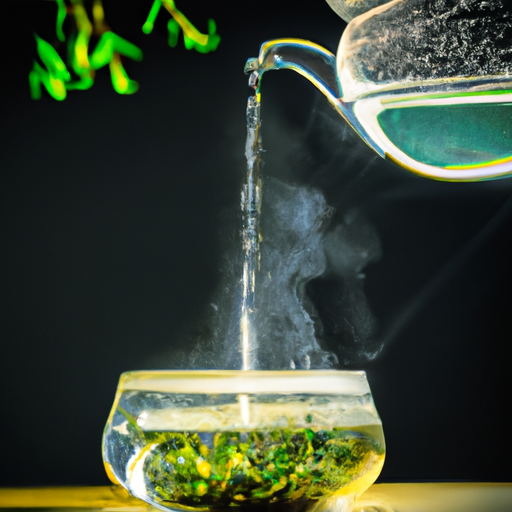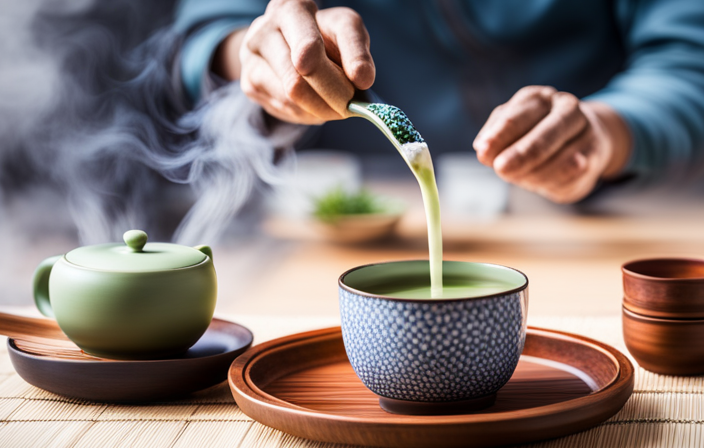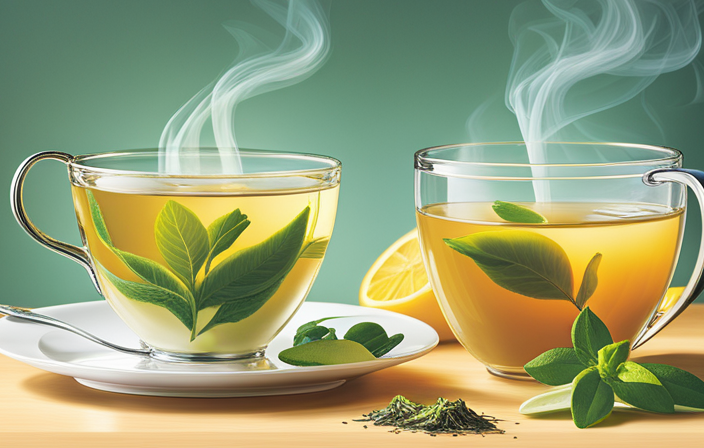Antioxidant Properties
The Ultimate Guide to Tea Antioxidants: What You Need to Know
Savor the secrets of tea antioxidants and unlock their health benefits—what surprising effects might your daily cup hold?

Tea is packed with antioxidants, making it a great choice for boosting your health. By enjoying just two to three cups daily, you can help reduce the risk of chronic diseases, including heart problems and certain cancers. Different types of tea offer unique benefits: green tea is rich in catechins, while black tea provides theaflavins. To maximize these antioxidant effects, pay attention to brewing techniques, like steeping time and water temperature. Plus, integrating tea into your daily routine can enhance social connections and overall wellness. Discovering more about the types and benefits of tea will enrich your experience even further.
Key Takeaways
- Tea is packed with antioxidants, particularly polyphenols, which help combat oxidative stress and promote overall health and longevity.
- Different types of tea have varying antioxidant profiles; green tea is highest in catechins, while herbal teas may contain even more antioxidants.
- Steeping time and water temperature significantly affect the extraction of antioxidants; optimal brewing typically requires 3-5 minutes with appropriate temperatures.
- Loose leaf tea generally retains higher antioxidant levels compared to tea bags, making it a superior choice for health benefits.
- Regular tea consumption, 2-3 cups daily, is linked to a reduced risk of chronic diseases, enhancing heart health and cognitive function.
Introduction

Tea's rich history as the world's second most-consumed beverage highlights its importance in many cultures. With over 50 billion servings consumed in the U.S. alone in 2004, tea isn't just a drink; it's a staple in daily life.
You might be surprised to learn that tea is packed with antioxidants, particularly flavonoids, which play a vital role in promoting health. These compounds help combat free radicals that can cause cell damage and contribute to chronic diseases. Furthermore, the increasing focus on sustainable practices in tea production ensures that consumers can enjoy these health benefits while supporting ethical and environmentally friendly farming methods. Herbal teas, in particular, can offer unique health benefits due to their diverse ingredients. For instance, many flower teas are known for their calming effects and overall wellness properties. Certain herbal teas can also aid in alleviating symptoms of specific conditions, enhancing their therapeutic value.
Among the various types of tea, green tea stands out due to its high concentration of catechins, with EGCG being the most studied and recognized for its numerous health benefits. Black and white teas also offer unique antioxidant profiles, with white tea being the least processed and highest in antioxidants.
Regular tea consumption has been linked to a reduced risk of chronic diseases, including heart disease and certain cancers. Just two cups of tea a day can significantly boost your health. Furthermore, the health effects of tea consumption can vary based on the type and quantity consumed, highlighting the importance of moderation.
Health Benefits of Tea Antioxidants

Unlocking the health benefits of tea antioxidants can significantly enhance your overall wellness. Regularly drinking tea rich in antioxidants, particularly flavonoids, can help reduce inflammation and support your heart health.
Studies show that those who enjoy two or more cups daily may lower their risk of chronic diseases, including heart disease and certain cancers. For instance, some research indicates a 46% decrease in ovarian cancer risk linked to consistent tea consumption.
Moreover, the polyphenols found in tea play a crucial role in enhancing mental clarity. They can help alleviate anxiety and promote better cognitive function, which may lead to improved mood stability.
You'll find that your focus sharpens after a comforting cup of tea.
Tea antioxidants also offer impressive skin health benefits. Their anti-aging properties can combat the signs of aging, making tea a valuable addition to your wellness-focused diet.
By incorporating tea into your daily routine, you're not just enjoying a delightful beverage; you're actively investing in your health and longevity.
Polyphenols Combat Oxidative Stress

The antioxidants in tea, particularly polyphenols, play a vital role in your body's defense against oxidative stress. These powerful compounds neutralize free radicals, which can cause cellular damage and contribute to chronic diseases like heart disease and certain cancers.
Green tea is especially rich in catechins, a type of polyphenol renowned for its impressive antioxidant capacity. Studies show that regular consumption of polyphenol-rich teas can significantly reduce oxidative stress, enhancing your overall cellular health.
What's remarkable is that the antioxidant capacity of polyphenols in tea can be up to five times higher than that found in many fruits and vegetables. This makes tea a potent source of protective compounds that help combat oxidative damage.
By incorporating a variety of antioxidant-rich teas into your diet, you can bolster your body's defenses against oxidative stress and promote long-term health benefits. Whether you prefer green tea, black tea, or herbal varieties, each can contribute to your overall well-being.
Interestingly, caffeine content in tea can also affect how these antioxidants are absorbed and utilized by the body, making the choice of tea even more significant.
Embracing a diverse selection of teas means you're not just enjoying a delicious beverage but also unleashing the power of polyphenols to support your health.
Cultural Significance of Tea Antioxidants

Throughout history, tea has been more than just a beverage; it's a cultural symbol that embodies community and tradition. With roots tracing back to Emperor Shen Nung in 2737 BC, tea was initially celebrated as a medicinal beverage in China. Its rich cultural history reveals how diverse cultures have embraced tea, developing unique customs and rituals around tea consumption, such as the intricate tea ceremonies in Japan and the cherished afternoon tea in England.
The antioxidants in tea, particularly polyphenols, have long been acknowledged for their health benefits, enhancing not just individual well-being but also fostering community bonding. During tea ceremonies, people gather, share stories, and strengthen social ties, turning tea into a catalyst for connection.
In many societies, the act of enjoying tea is intertwined with cultural significance, highlighting the beverage's role in social interactions. Today, as the second most-consumed beverage globally, tea continues to reflect a commitment to health-conscious lifestyles.
The appreciation of antioxidants in tea transcends borders, making it a vital component of both personal health and collective cultural practices across diverse cultures.
Debates on Antioxidant Efficacy

Debates surrounding the efficacy of antioxidants in tea have sparked significant interest among researchers and health enthusiasts alike. While many teas, especially green tea, are celebrated for their antioxidant content, research suggests that not all teas offer the same health benefits.
For instance, hibiscus tea boasts over 400% more antioxidants than green or black teas, raising questions about the comparative effectiveness of these beverages.
Although antioxidants are known to combat free radicals, the actual health benefits can vary widely based on individual metabolic factors and lifestyle choices. The FDA hasn't approved health claims for green tea or other teas due to a lack of sufficient studies, emphasizing the need for more rigorous research to ascertain their true impact.
Some studies, like one published in the American Journal of Clinical Nutrition, support the idea that green tea extracts may aid in fat burning; however, the effectiveness of brewed tea versus supplements remains uncertain.
Ongoing research continues to explore the potential health benefits of tea antioxidants, with findings indicating that regular tea consumption might contribute to a reduced risk of chronic diseases, including various cancers.
Practical Applications

Understanding the varying antioxidant levels in different teas opens up exciting ways to incorporate these beverages into your daily routine. By adding a variety of antioxidant-rich teas, like green tea, white teas, and herbal infusions, you can significantly boost your antioxidant intake and combat free radical damage.
To maximize the health benefits of your teas, steep them for the recommended time to enhance the extraction of flavonoids and polyphenols. Opting for loose-leaf tea over tea bags often results in higher antioxidant levels, as whole leaves retain more nutrients.
Drinking two to three cups of tea daily can help reduce the risk of chronic diseases, including heart disease and certain cancers, by consistently providing your body with antioxidants.
Explore different flavors and types of tea to cater to your personal preferences while promoting a healthier lifestyle. For instance, hibiscus tea offers a unique taste and antioxidant profile, making it a delightful addition to your routine.
Conclusion
In conclusion, understanding tea antioxidants can truly enhance your health journey. By incorporating various types of tea into your daily routine, you can combat oxidative stress and enjoy a myriad of health benefits. Remember, while the science behind antioxidants is compelling, it's essential to approach it with balance and moderation. So, grab your favorite cup of tea and savor not just the flavor, but the wellness it brings to your life. Cheers to your health!
Antioxidant Properties
Tea Drinkers Have 50% More Antioxidants—Here’s Why
Plunge into the world of tea and discover how its antioxidants can elevate your health—what other benefits might await you?

If you’re a tea drinker, you’re likely benefiting from a 50% higher antioxidant level compared to non-drinkers. This boost primarily comes from polyphenols found in tea, especially catechins in green tea. These antioxidants help reduce inflammation and combat oxidative stress, protecting your cells from damage. While bottled teas often contain significantly fewer polyphenols, home-brewed varieties pack a punch—providing 50-150 mg per cup. So, by choosing tea over other beverages, you’re enhancing your overall well-being. Curious about how tea’s antioxidant power stacks up against coffee and its other health benefits? There’s more to explore.
Key Takeaways
- Tea is rich in antioxidants, particularly polyphenols, with home-brewed tea containing 50-150 mg per cup compared to less than 10 mg in bottled teas.
- Regular tea consumption increases antioxidant capacity by 50%, aiding in chronic disease prevention and overall health.
- Green tea is especially high in catechins like EGCG, which enhance antioxidant effects and combat oxidative stress.
- Proper brewing techniques maximize antioxidant absorption, making homemade tea a healthier choice than bottled options.
- Lower caffeine levels in tea, paired with L-theanine, promote relaxation and mental clarity, contributing to overall wellness among tea drinkers.
Introduction

Have you ever wondered why tea drinkers seem to enjoy better health? One key reason is the high levels of antioxidants found in brewed tea.
When you brew a cup of tea, you’re not just enjoying a warm beverage; you’re also consuming 50-150 mg of polyphenols, which are powerful antioxidants. This is especially true for green tea, renowned for its rich catechins like EGCG. Additionally, many herbal teas, like peppermint oil, can offer complementary health benefits due to their natural properties. Herbal teas, such as chamomile and peppermint, are often used for medicinal purposes that can enhance overall wellness. Studies have shown that these teas can combat oxidative stress, further contributing to their health benefits.
Unlike bottled teas that often contain less than 10 mg of polyphenols, freshly brewed tea maximizes your antioxidant intake. Additionally, certain herbal teas, such as turmeric tea, can further enhance your antioxidant levels due to their high content of anti-inflammatory compounds.
Antioxidants Combat Oxidative Stress

Through their powerful properties, antioxidants in tea effectively combat oxidative stress in your body. The primary antioxidants found in tea are polyphenols, which play a crucial role in neutralizing free radicals that contribute to cellular damage.
When you indulge in regular tea consumption, you’re likely consuming 50-150 mg of polyphenols per cup, significantly more than what many bottled teas offer. This higher intake helps inhibit lipid peroxidation, protecting your cell membranes from oxidative damage.
Studies reveal that tea drinkers have a 50% higher antioxidant capacity compared to non-drinkers, translating to impressive health benefits. By incorporating tea into your routine, you enhance your body’s defense against chronic diseases, as these antioxidants help reduce inflammation markers and improve metabolic health.
This means that every sip not only tastes good but also works to keep harmful oxidative stress at bay.
0% More Antioxidants Than Coffee

When it comes to antioxidants, tea consistently outshines coffee, providing a robust source of health benefits.
Tea, especially green tea, is rich in polyphenols, particularly catechins, which are known for their strong antioxidant properties. Studies show that home-brewed tea can contain between 50-150 mg of polyphenols per cup, while most bottled teas fall short, often delivering less than 10 mg. This higher concentration makes green tea a preferred choice for those seeking significant antioxidant benefits. Additionally, yerba mate, another tea-like beverage, is also rich in antioxidants that can further enhance your health. Moreover, regular consumption of beet juice may also contribute to increased antioxidants in your diet, supporting overall cellular health. Drinking tea regularly can also reduce inflammation in the body, which is beneficial for overall well-being. Furthermore, some studies suggest that flossing can play a crucial role in maintaining oral health, allowing for better nutrient absorption, including antioxidants.
Regular tea drinkers may enjoy a reduced risk of chronic diseases, including cardiovascular disease, thanks to the higher antioxidant intake from tea.
The antioxidant effects of tea help inhibit lipid peroxidation and scavenge free radicals, contributing to improved overall health. In fact, the anti-inflammatory properties of tea may lower inflammation markers more effectively than coffee.
Ultimately, if you’re looking to boost your antioxidant levels and enhance your health, choosing tea over coffee is a smart move. Additionally, incorporating retirement savings options into your financial planning can provide long-term health benefits by reducing stress associated with financial insecurity.
With its superior polyphenol profile and proven health benefits, tea offers a delicious way to combat oxidative stress and support your well-being.
Tea’s Unique Polyphenol Profile

Tea boasts a remarkable polyphenol profile that sets it apart from other beverages. Tea polyphenols, primarily composed of flavonoids and catechins, make up 18% to 36% of the dry weight of tea leaves, serving as a significant source of antioxidants. Among these, EGCG (epigallocatechin gallate) stands out, representing about 59% of total catechins and contributing immensely to tea’s health benefits.
These tea polyphenols exhibit powerful antioxidant activity, effectively scavenging free radicals and regulating oxidase activity. This process helps mitigate oxidative stress, which is linked to various chronic diseases. By inhibiting lipid peroxidation, tea polyphenols protect your cells from damage, thereby reducing the risk of health issues. Additionally, rapeseed honey provides antioxidants that can further support your body’s defenses against oxidative damage.
Furthermore, they enhance the activity of antioxidant enzymes such as catalase, glutathione peroxidase, and superoxide dismutase, bolstering your body’s natural defenses. Additionally, certain flower teas offer unique health benefits that complement the antioxidant effects of traditional tea consumption.
Incorporating tea into your daily routine can lead to significant health advantages. Regular consumption of tea polyphenols not only promotes overall well-being but also plays a crucial role in preventing chronic diseases, thanks to their unique antioxidant properties.
Caffeine Sensitivity in Tea Drinkers

Many people appreciate tea for its lower caffeine content compared to coffee, making it a suitable choice for those sensitive to caffeine. If you’re one of those individuals, you might find that green tea, with about 28 mg of caffeine per cup, or black tea, with approximately 50 mg, can provide a gentle boost without the jitters.
Your sensitivity to caffeine plays a significant role in how tea affects you; many tea drinkers report experiencing less anxiety and better sleep quality after consumption. Additionally, tea contains L-theanine, an amino acid that helps promote relaxation and improves focus. This means you can enjoy the health benefits and cognitive function enhancements associated with moderate tea consumption without the high energy spikes often linked to coffee. Furthermore, tea is rich in antioxidants that contribute to its many health benefits, making it a wise choice for overall wellness. Regular consumption of tea can also support mental clarity and enhance mood, similar to the benefits associated with various essential oils. The calming effects of tea can be compared to aromatherapy practices that promote relaxation and well-being, as relaxation before sleep can also enhance the quality of your rest. If you’re looking to minimize caffeine even further, decaffeinated tea options retain most of the antioxidants and health benefits of regular tea while keeping caffeine levels low. In addition, the antioxidants in tea can help reduce inflammation in the body, which is beneficial for overall health.
Practical Applications

For those looking to maximize the health benefits of tea, understanding how to effectively brew and consume it’s key. Home-brewed tea, especially green tea, offers significantly higher levels of polyphenols—50-150 mg per cup—compared to many bottled teas, which can have less than 10 mg per serving. Additionally, brewing tea at the correct water temperature enhances the flavor and antioxidant absorption. The use of energy-efficient technology in tea brewing appliances can also contribute to a consistent ideal brewing temperature. Recent studies suggest that certain tea varieties may also shield the mind from dementia’s grip.
To get the most antioxidants, drink freshly brewed tea within 24 hours. This ensures you’re tapping into the maximum health benefits that these polyphenols provide.
If you prefer convenience, consider green tea extract as a concentrated alternative to bottled teas. It delivers a robust dosage of antioxidants without the downsides of shelf-life degradation.
However, be cautious with product labeling; many bottled teas contain sugar levels similar to soda, which can undermine their health benefits. Additionally, steeping tea for the right amount of time can help increase the caffeine content and the antioxidant levels, optimizing the health benefits of your brew.
To truly benefit from drinking tea, brew it yourself and stay informed about what’s in your beverages. This way, you’ll enjoy the richness of antioxidants while avoiding the pitfalls of sugar-laden bottled options.
Conclusion
Incorporating tea into your daily routine can boost your antioxidant intake significantly. With its unique polyphenol profile, tea not only outshines coffee in antioxidant content but also helps combat oxidative stress. If you’re sensitive to caffeine, tea offers a gentler option without sacrificing health benefits. So, whether you prefer a calming herbal blend or a robust black tea, sipping on this ancient beverage can enhance your well-being and support a healthier lifestyle. Cheers to better health!
Antioxidant Properties
How Antioxidants in Tea Protect You From Disease
Outstanding antioxidants in tea combat diseases and enhance your health, but what specific benefits can you uncover with each sip?

Antioxidants in tea, especially polyphenols like catechins and EGCG, help protect you from diseases by fighting oxidative stress. These powerful compounds scavenge harmful free radicals, lower LDL cholesterol, and reduce inflammation. Regularly sipping green tea can lead to improved heart health and a lower risk of chronic illnesses like cancer and diabetes. Additionally, the antioxidants enhance your body's natural defenses, promoting overall wellness and longevity. To get the most benefits, pay attention to tea type and preparation. There's so much more to discover about how tea can boost your health, so keep exploring its amazing properties.
Key Takeaways
- Antioxidants in tea, particularly catechins and EGCG, lower LDL cholesterol and reduce inflammation, promoting heart health and preventing cardiovascular diseases.
- Regular tea consumption is linked to improved glycemic control, reducing the risk of type 2 diabetes.
- Polyphenols in tea scavenge reactive oxygen species, decreasing oxidative stress and lowering chronic disease incidence.
- High antioxidant levels in green tea support cancer prevention and enhance overall well-being and longevity.
- Consuming tea as part of a healthy lifestyle is associated with lower rates of neurodegenerative disorders and chronic diseases across various cultures.
Introduction

When you sip a cup of tea, you're not just enjoying a warm beverage; you're also indulging in a powerhouse of antioxidants. Green tea, in particular, is packed with polyphenols like catechins and EGCG, which combat free radicals. These harmful molecules can lead to cellular damage and increase the risk of chronic diseases.
By incorporating green tea into your daily routine, you may significantly reduce your chances of developing conditions like heart disease and cancer.
Research shows that drinking three cups of green tea daily is linked to an 11% decrease in heart attack rates. The antioxidants in green tea can lower LDL cholesterol levels and reduce inflammation, promoting better cardiovascular health.
Additionally, these powerful compounds have been shown to inhibit cancer cell growth, contributing to lower cancer rates in populations that consume higher amounts of green tea.
Moreover, green tea's polyphenols improve glycemic control, aiding in the management of blood sugar levels in those with type 2 diabetes.
With these numerous health benefits, making green tea a staple in your diet can be a simple yet effective way to protect your overall health.
Tea's Rich Polyphenol Content

Tea's rich polyphenol content, especially in green tea, makes it one of the most effective sources of antioxidants available. The catechins in green tea, which account for 18% to 36% of the dry weight of tea leaves, are particularly notable. Among these, epigallocatechin gallate (EGCG) stands out, contributing around 59% of total catechins and showcasing powerful antioxidant properties. Regular consumption of herbal tea can also complement the benefits of green tea by providing additional antioxidants through various plant compounds. Herbal teas are particularly known for their unique flavors and benefits, which can enhance overall health. Furthermore, rooibos tea is rich in antioxidants, adding to the diversity of options available for boosting your health. Additionally, herbal teas like chamomile and ginger may help alleviate menstrual discomfort, further contributing to the overall benefits of tea.
By regularly consuming tea polyphenols, you can significantly lower oxidative stress markers and reduce your risks of chronic diseases such as cardiovascular issues and certain cancers. The antioxidant activity of these compounds involves scavenging free radicals, inhibiting lipid peroxidation, and regulating antioxidant enzyme levels, all of which lead to impressive health benefits. Additionally, oolong tea, known for its rich antioxidants, can further promote overall health and provide essential benefits beyond those found in green tea.
In fact, a daily intake of polyphenols from tea can help you meet the recommended levels, with countries like Japan deriving up to 34% of their total polyphenol intake from green tea alone.
Polyphenols Combat Oxidative Stress

Regularly consuming polyphenols, especially catechins like EGCG from green tea, effectively combats oxidative stress in your body. These powerful antioxidants scavenge reactive oxygen species (ROS), reducing the harmful effects of oxidative stress.
By incorporating green tea into your daily routine, you can enhance the activity of vital antioxidant enzymes like superoxide dismutase (SOD) and catalase, which protect your cells from oxidative damage.
Studies show that regular green tea consumption is linked to lower levels of oxidative stress markers, which are often associated with chronic diseases such as cardiovascular disease and cancer. The polyphenols in green tea also have the ability to chelate transition metals, preventing the formation of free radicals that contribute to oxidative damage.
Epidemiological research suggests that individuals who consume high amounts of green tea experience a lower incidence of diseases related to oxidative stress, including neurodegenerative disorders and various cancers.
Cultural Significance of Tea Antioxidants

Emphasizing its rich history, tea has been cherished for over 3,000 years, particularly in China, where it's renowned for its health benefits, including potent antioxidant properties. The global tea market was valued at approximately $200 billion in 2022, reflecting its widespread consumption and cultural importance. Additionally, many sustainable brands in the coffee culture emphasize the importance of ethical sourcing, aligning with the values of health-conscious consumers.
Across various cultures, the cultural significance of tea, especially green tea, is profound. In Japan, for instance, green tea practices are woven into rituals and ceremonies, highlighting its role as a source of antioxidants and overall well-being. Research indicates that coffee's health benefits also stem from its antioxidant content, which further emphasizes the importance of these compounds in promoting health. The preparation and serving of tea often reflect a commitment to mindfulness and respect, enhancing the overall experience and appreciation of this ancient beverage.
You mightn't realize it, but green tea contributes to about 34% of daily polyphenol intake in countries like Japan, underscoring its importance in health and disease prevention. Studies show that populations with high tea consumption often exhibit lower rates of chronic diseases, which reinforces its status as a health-promoting beverage. Traditional beliefs align with modern research, emphasizing that the antioxidants in tea, particularly catechins, are crucial in combating oxidative stress—a common factor in many diseases. Additionally, the health benefits of ginger lemon tea can further enhance antioxidant intake, providing a delicious way to support overall wellness.
This intersection of tradition and science enhances tea's cultural significance as a medicinal drink, encouraging you to appreciate not just its flavor but also its remarkable health benefits.
Variability in Antioxidant Potency

Understanding the variability in antioxidant potency is essential for maximizing the health benefits of your tea. Green tea, in particular, is rich in polyphenols, especially catechins like EGCG, which contribute to its powerful antioxidant effects. However, the antioxidant content can vary significantly based on several factors. Different types of tea, processing methods, and specific cultivars can all influence the levels of these beneficial compounds.
Brewing methods also play a crucial role. The temperature and steeping time can greatly affect how much antioxidant is extracted from the leaves. Research shows that a typical cup of green tea can provide between 50-150 mg of antioxidants, illustrating this variability.
Moreover, your individual response to tea's antioxidants may differ depending on genetic factors, age, and overall diet. These elements impact how efficiently your body absorbs and utilizes these compounds.
Additionally, the bioavailability of tea polyphenols can be influenced by interactions with other dietary components, like fats and proteins, which may enhance or inhibit their antioxidant action. Understanding these nuances can help you choose the best tea and brewing method to optimize your antioxidant intake.
Practical Applications

Tea's remarkable health benefits extend beyond mere enjoyment, offering practical applications that can enhance your well-being. Incorporating green tea into your daily routine is a simple yet effective way to unleash its powerful antioxidants, particularly epigallocatechin gallate (EGCG) and polyphenols. Research shows that drinking three cups of green tea daily can reduce heart attack rates by 11%, showcasing its protective role against cardiovascular disease. Additionally, studies suggest that risk management strategies can be beneficial when considering various health investments, including dietary choices.
Moreover, the polyphenols in green tea improve glycemic control, making it a smart choice for those managing type 2 diabetes. Regular consumption can lead to lower fasting blood glucose levels, aligning with the principles of the Law of Attraction that emphasize positive habits for better health. Interestingly, similar benefits can be found in yerba mate, which is also rich in antioxidants and polyphenols. Engaging with educational toys during early childhood can foster cognitive development and creativity, reinforcing the idea that proactive choices in various aspects of life contribute to overall well-being.
Additionally, the anti-inflammatory properties of catechins may bolster liver health, helping prevent liver diseases. This aligns with the holistic approaches to well-being that are increasingly recognized in the personal development industry.
For those aiming for longevity, studies indicate that consuming five or more cups of green tea daily correlates with lower mortality rates. Furthermore, combining green tea with anti-inflammatory breakfasts may enhance its health-promoting effects.
By embracing green tea, you not only enjoy a delightful beverage but also proactively support your health against chronic diseases like cancer.
Conclusion
Incorporating tea into your daily routine can be a simple yet effective way to boost your health. The rich polyphenols in tea combat oxidative stress and may help protect you from various diseases. Plus, the cultural significance of tea reminds us of its long-standing value in promoting well-being. Just keep in mind that not all teas are created equal, so experimenting with different varieties can help you find the best source of antioxidants for your needs.
Antioxidant Properties
This Type of Tea Is a Skin-Saving Antioxidant Bomb
Learn how this remarkable tea can transform your skin, revealing secrets that might just leave you wanting more.

Green tea is truly an antioxidant bomb for your skin. Packed with catechins and polyphenols, it fights free radicals, reduces inflammation, and boosts your skin's elasticity. Regular use can brighten your complexion by inhibiting melanin production and help combat issues like acne and rosacea. Plus, it protects against UV damage, making it a must-have in your skincare routine. Just be aware that some might experience allergic reactions, so it's wise to do a patch test first. Discover how to incorporate this ancient beauty secret into your daily rituals for even greater benefits.
Key Takeaways
- Green tea is a powerful antioxidant, rich in catechins and polyphenols that protect skin from free radicals and oxidative stress.
- Its high polyphenol content enhances collagen production, improving skin elasticity and reducing wrinkles.
- Green tea's anti-inflammatory properties soothe irritated skin, making it effective for acne and rosacea treatment.
- Regular use of green tea in skincare routines promotes a brighter complexion and reduces dark spots by inhibiting melanin production.
- Topical application of green tea extract protects skin against UV damage and enhances overall skin tone and texture.
Introduction

When it comes to skincare, antioxidants play a crucial role in keeping your skin healthy and vibrant. One of the standout options is green tea, derived from the leaves of Camellia sinensis. Its remarkable antioxidant properties, particularly from catechins like EGCG (epigallocatechin gallate), help combat free radicals that can lead to skin damage. In addition to its skin benefits, green tea also provides hydration support due to its high water content. Cold medications can sometimes cause skin dryness, making hydration even more important. Additionally, eucalyptus oil is known for its antiseptic qualities, which can further assist in promoting overall skin health.
By incorporating green tea into your routine, you'll gain significant protection against UV radiation, which helps prevent premature aging and skin cancers.
Green tea also offers impressive anti-inflammatory properties. If you struggle with skin conditions like acne breakouts or rosacea, green tea can help reduce irritation, redness, and swelling. Its antibacterial effects actively promote clearer skin by treating acne and unclogging pores, making it a popular ingredient in various skincare products.
Moreover, green tea enhances hydration and improves skin texture, leading to a more youthful and radiant appearance. Research suggests that green tea's antioxidants can also support liver health, which may further benefit your skin.
By adding green tea toners or masks to your skincare arsenal, you can harness the full potential of this powerful ingredient. Embracing green tea in your skincare routine can transform your skin health, giving you a vibrant glow that fights the effects of time and environmental stressors.
Green Tea's Rich Polyphenol Content

Green tea's rich polyphenol content, particularly its high levels of catechins like EGCG, makes it a powerhouse for skin health.
These polyphenols act as potent antioxidants, combating oxidative stress that leads to skin damage. By incorporating green tea into your routine, you can help reduce inflammation and irritation, which is especially beneficial for conditions like acne and rosacea.
Moreover, green tea polyphenols protect against UV-induced damage, inhibiting the formation of harmful DNA structures and potentially reducing your risk of skin cancer.
They also enhance collagen production, improving skin elasticity and minimizing the appearance of fine lines and wrinkles.
If you're looking to brighten your complexion, green tea can help with that too; its antioxidants inhibit melanin production, helping to reduce dark spots and promote an even skin tone.
By sipping on this antioxidant-rich beverage or using products infused with green tea, you're investing in your skin's health, ensuring it looks youthful and radiant. Traditional tea ceremonies often highlight the importance of mindfulness while enjoying your tea, further enhancing its health benefits.
With green tea, you're not just enjoying a delicious drink; you're also nourishing your skin from within.
High Catechin Concentration Benefits Skin

The high catechin concentration in green tea, particularly the powerful EGCG, offers remarkable benefits for your skin. These catechins act as potent antioxidants, protecting your skin from free radicals that can cause damage. By reducing oxidative stress, they help prevent premature aging and various skin conditions, promoting healthier and more resilient skin.
EGCG is especially effective at inhibiting reactive oxygen species (ROS) and reducing inflammation, which means it can calm irritation and redness effectively.
You'll appreciate that incorporating green tea into your skincare routine can enhance skin hydration and moisture retention, supporting a plump and youthful appearance. This improved barrier function helps your skin stay hydrated throughout the day.
Moreover, the high levels of catechins in green tea are linked to boosting collagen production. Increased collagen means better skin elasticity, helping to reduce the appearance of fine lines and wrinkles.
Ancient Beauty Secret Revealed

For centuries, people have turned to green tea as an ancient beauty secret, recognizing its remarkable ability to promote healthy skin. This elixir, rich in antioxidants, particularly catechins like EGCG, combats oxidative stress and reduces inflammation. By aiding in DNA repair, green tea becomes a powerful ally in your anti-aging skincare routine. Additionally, incorporating time management techniques into your daily routine can help you make time for self-care practices like enjoying a cup of green tea. Furthermore, ensuring proper nutrition is essential for overall skin health and can enhance the benefits of your skincare regimen.
The polyphenols found in green tea effectively reduce skin irritation, redness, and swelling, making it a fantastic remedy for conditions like acne and rosacea. Historically celebrated in Eastern medicine, its antibacterial properties not only treat acne but also help unclog pores, leading to clearer skin. Moreover, consuming flower teas has also been linked to enhancing skin health due to their hydration and nutrient content.
Numerous studies have validated this ancient beauty secret, confirming that green tea can protect your skin from harmful UV radiation while enhancing overall skin tone and texture. Additionally, incorporating herbal teas into your routine can provide a range of health benefits, further supporting your skin's vitality.
When you sip on this soothing beverage or apply it topically, you're doing wonders for your skin health. So, whether you indulge in a cup or use it in your skincare products, green tea is a time-tested solution that offers a multitude of benefits, making it an essential component of any beauty regimen.
Potential Allergic Reactions

Experiencing allergic reactions to green tea can be a concern for some individuals, as its use may lead to skin irritation, rashes, or swelling when applied topically.
If you've got sensitivities to caffeine or tannins—which are present in green tea—you might also face headaches or digestive discomfort after consumption or topical application. Glycolic acid can be an effective alternative for those seeking gentle exfoliation without the risk of allergic reactions.
Before diving into green tea products, consider doing a skin test to check for any sensitivity. Reactions can vary widely among people, and it's better to be safe than sorry.
If you notice symptoms like difficulty breathing or swelling of your face and throat, seek immediate medical attention.
Pregnant women or those nursing should consult a physician before using green tea, whether topically or ingested, as it may provoke allergic responses in sensitive individuals. Additionally, it's important to be aware of any potential essential oil safety issues when combining green tea with other products.
By staying informed and cautious, you can enjoy the benefits of green tea without the risk of allergic reactions compromising your skin and overall health.
Practical Applications

Understanding potential allergic reactions to green tea is important, but once you've ensured your skin can handle it, there are numerous practical applications to explore.
Green tea is a powerhouse of antioxidants, particularly catechins and polyphenols, which can significantly enhance your skin health. You can easily incorporate it into your skincare routines through products like Matcha Cleansing Balm or Green Tea EGCG Concentrate Serum. Aromatherapy techniques that utilize essential oils can further complement these skincare methods. For instance, the calming effects of lavender oil can enhance your overall relaxation during your skincare routine. Additionally, the antioxidant effects of green tea help combat oxidative stress in the skin, promoting a more youthful appearance. Regular consumption of green tea can also support overall health and well-being due to its rich nutrient profile.
For combating issues like acne and rosacea, consider using green tea-infused masks or toners. The topical application of green tea extract before sun exposure can help mitigate UV damage, reducing erythema and protecting your skin's DNA.
Regular use of these products can also promote collagen production, improving skin elasticity and reducing the appearance of fine lines and wrinkles.
If you struggle with dark circles, try applying cooled green tea bags around your eyes. This simple method effectively reduces puffiness and brightens your under-eye area. Additionally, the anti-inflammatory properties of green tea can further soothe irritated skin and enhance overall skin health.
Conclusion
Incorporating green tea into your skincare routine can be a game-changer for your skin. Its rich polyphenols and high catechin concentration work wonders in fighting free radicals and reducing inflammation. Plus, you're tapping into an ancient beauty secret that's stood the test of time. Just be mindful of potential allergic reactions. So, brew a cup or grab a green tea-infused product, and watch your skin glow with health and vitality!
-

 Tea Brewing and Preparation2 weeks ago
Tea Brewing and Preparation2 weeks agoThe Science Behind Decaffeinated Tea: Methods And Benefits
-

 Tea Brewing and Preparation3 weeks ago
Tea Brewing and Preparation3 weeks agoAfternoon Tea Etiquette: 12 Dos And Don’Ts
-

 Tea Industry Trends and Innovations1 week ago
Tea Industry Trends and Innovations1 week agoCritical Thinking Is Important For Evaluating Which Parts Of Advertisement
-

 Tea Brewing and Preparation2 weeks ago
Tea Brewing and Preparation2 weeks agoExploring English Breakfast Tea: Flavors, Blends, And Recommendations
-

 Tea Brewing and Preparation2 weeks ago
Tea Brewing and Preparation2 weeks agoStarting A Profitable Tea Business: Tips, Resources, And Success Stories
-

 Tea Brewing and Preparation3 weeks ago
Tea Brewing and Preparation3 weeks agoHow To Cold Steep Tea (And Why!)
-

 Herbal Tea4 days ago
Herbal Tea4 days agoWhat Happened To Cup Of Life Organic Herbal Tea
-

 Herbal Tea3 days ago
Herbal Tea3 days agoHow Much Water To Use For Herbal Tea










